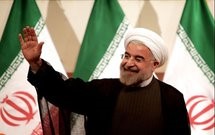 In 1979, shortly after the revolution that established the current Iranian regime, Tehran broke off relations with the United States. Nearly 35 years later, it is now Iran that seeks to end hostilities.
In 1979, shortly after the revolution that established the current Iranian regime, Tehran broke off relations with the United States. Nearly 35 years later, it is now Iran that seeks to end hostilities.
When they begin, direct public bilateral talks between Washington and Tehran will constitute a significant breakthrough. Major progress is unlikely anytime soon, however, especially since it is far more complicated for the United States to move forward than it is for Iran.
Under its new president, Hassan Rouhani, Iran has issued a barrage of statements expressing eagerness to negotiate with the United States, a topic it finally appears to have achieved internal coherence on. In a Sept. 18 television interview with NBC, the first with an American news organization since taking office, Rouhani categorically stated that his country has never sought nuclear weapons nor will it ever in the future.
He added that the Islamic republic sought peaceful relations with all countries. These comments came on the heels of unprecedented statements issued by Iran's supreme leader, Ayatollah Ali Khamenei, who said that he did not oppose compromise in diplomacy and supported flexibility.
Iran's incentive behind pursuing negotiations is the need to address its seriously degraded economy. This need explains why the Iranians are pushing aggressively for formal talks with the United States and are waiting for the Americans to reciprocate. Media reports have emerged that the Obama administration is in fact preparing to engage in talks with Iranian officials during Rouhani's trip next week to New York for the annual session of the U.N. General Assembly.
Even so, the United States is proceeding much more cautiously for many reasons. For one, the Americans are not under any significant pressure to rush into negotiations with the Iranians. When U.S. forces were in Iraq, Washington needed Iran, something that is no longer the case. There is also considerable opposition to diplomatic engagement with Tehran from several quarters within Washington.
U.S. President Obama is at his weakest position since he first became president, particularly after the recent Syrian chemical weapons crisis in which Russia was able to exploit the U.S. desire to avoid military action in Syria. Obama thus risks coming under severe criticism for appearing to concede too much to the Iranians. Beyond domestic political hurdles, far more significant geopolitical obstacles lie in the path to any meaningful U.S.-Iranian diplomacy.
U.S.-Iranian negotiations have implications for the balance of power in the Middle East and for Washington's relations with its allies in the region. U.S. concessions to Iran are of particularly grave concern to Saudi Arabia and Israel. The Saudis and the Israelis fear that a de-escalation of tensions with the United States will only enhance the Iranian position in the region to the detriment of their own.
Certainly, the United States can benefit from cooperation with the Iranians to better manage Syria, especially the threat posed by jihadists. This would not be the first time, since Tehran and Washington cooperated against al Qaeda and the Taliban in Afghanistan and for a period after the U.S. invasion of Iraq. But those were tactical-level arrangements that did not alter the overall state of hostile relations between the two sides and thus did not impact U.S. alignments in the region.
The current diplomatic initiative is of a strategic nature, however. Even a modest level of success could enhance the Iranian position and upset the existing geopolitical architecture. From the U.S. point of view, there is no good way to improve relations with the Iranians and balance those ties against its present ties with Saudi Arabia, the Gulf Arab states, Israel, Turkey and Egypt.
The principal reason for this is that even if normal diplomatic relations were restored, Iran would not become an American ally. On the contrary, it would continue to pursue its independent foreign policies. This means it would still be difficult for the United States to maintain a balance of power in the region, especially as the Arab world is in a long-term state of meltdown, which the Iranians are hoping to exploit to their advantage. U.S. and Iranian negotiators are therefore going to have a hard time at the bargaining table.
Courtesy : Stratfor (www.stratfor.com)